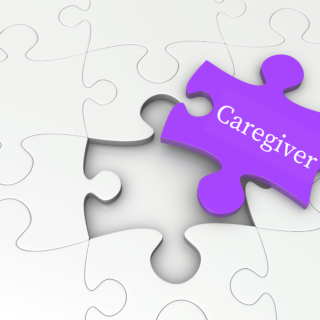
Why It’s Important to Identify as a Caregiver
So, you think you are a caregiver, but do you really identify as one? A study revealed that just 42 percent of caregivers self-identified. Thirty-five percent of them did not comprehend they were caregivers until someone explained the role to them.
Even more concerning, 24 percent of caregivers still did not identify with the role, even after it was explained to them.
No big deal, you might think. After all, isn’t it more important to just get on with your caregiver responsibilities than it is to wear the caregiver label?
No argument there. Ensuring that your loved one is getting the care they need is paramount. However, identifying with your role and accepting it not only impacts the quality of care you give, but it also impacts how you care for yourself during this challenging role.
5 Reasons Why It’s Important to Self-Identify as a Caregiver

It Makes Self-Care a Priority
As the old saying goes, you can’t take care of anyone else unless you first take care of yourself. While caregiving is a very rewarding experience, it is well-established that many caregivers suffer negative physical, emotional and mental consequences as a result of their role.
When you do not identify as a caregiver, you are even more likely to brush aside these profound negative side effects that impact your quality of life. This includes your relationship with the loved one you are caring for, your family and friends, and your work.
Identifying as a Caregiver Improves Your Ability to Care.
It makes you more physically, emotionally and mentally capable in your caregiving role. You understand the demands and more readily prioritize learning as much as you can, getting other family members involved and seeking community support when it’s necessary.
Seen through a clear lens, not identifying as a caregiver is a form of denial. Whether it’s conscious or unconscious, denial as a caregiver can make you feel more isolated, burdened, anxious, and even regretful about your role. Over time, as the full weight of being a caregiver hits you, you might even develop resentment and depression.
It Prepares You for Long-term Duty.
Research clearly shows that caregivers who identify with their role are more likely to seek support in the early stages of their journey. Furthermore, self-identifying as a caregiver significantly increases the likelihood of carrying out your duties over a longer period.
On average, a caregiver is in their role for four years. However, as the University of Alberta stated, caregiving can last for decades for some caregivers. In some cases, as much as 30 years.
If identifying as a caregiver can get you through that long haul, it’s a pretty small ask that will provide huge rewards.

It Protects Your Financial Wellbeing
One of the biggest burdens of caregiving is the financial toll it takes on the caregiver, their immediate family as well as the person for whom they are caring.
According to Family Caregivers of British Columbia, caregiving costs can range from $1500 to $5000, depending on how much care and other services are needed.
Yet, only about 14 percent of unpaid spousal caregivers and 5 percent of unpaid caregivers who look after their parents receive any type of government financial assistance.
Identifying as a caregiver is very likely to make you more proactive about seeking out available funding from local, provincial and federal sources.

It Encourages You to Find Community
Whatever level of caregiving you are providing — long or short hours, basic or complex duties — you will benefit from a support network.
One study looked at the benefits of programs designed to assist family caregivers of people with Alzheimer’s. They found that they improved the overall quality of life as well as five specific areas: depressive symptoms, caregiver burden (including stress), attention to self-care activities and their level of support.
Also, quite importantly, the support programs for caregivers reduced problem behaviors shown by their loved ones with dementia. Plus, the loved ones were less likely to enter an institution.
Even just finding a group of caregivers to share challenges, solutions, experiences, fears, and hopes can work wonders for your wellbeing. As a consequence, it improves your caregiver and overall relationship with your loved one.
But all these benefits are more likely to occur if you first identify as a caregiver.
What To Do Next
Make no mistake about it. Self-identifying as a caregiver is one of the most empowering steps you can take on your journey. Find resources, programs and people who can help you make that transformative leap at Caregivers Alberta.
For caregiver supports across Canada, visit our resource page here.

SOURCES
HeretoHelp: The Caregiver Identity Crisis
https://www.heretohelp.bc.ca/visions/supporting-adult-children-vol15/the-caregiver-identity-crisis
University of Alberta: Caregiving can last for decades, new research shows
https://www.ualberta.ca/folio/2020/09/caregiving-can-last-for-decades-new-research-shows.html
NIH: Studies Show Benefits of Caregiver Support Programs

